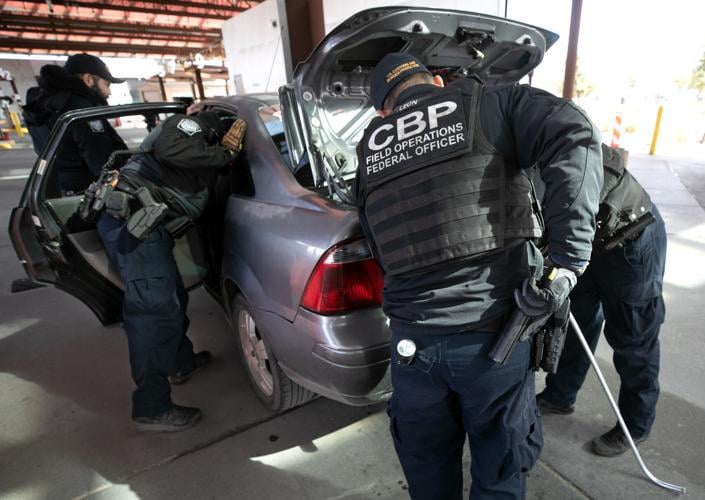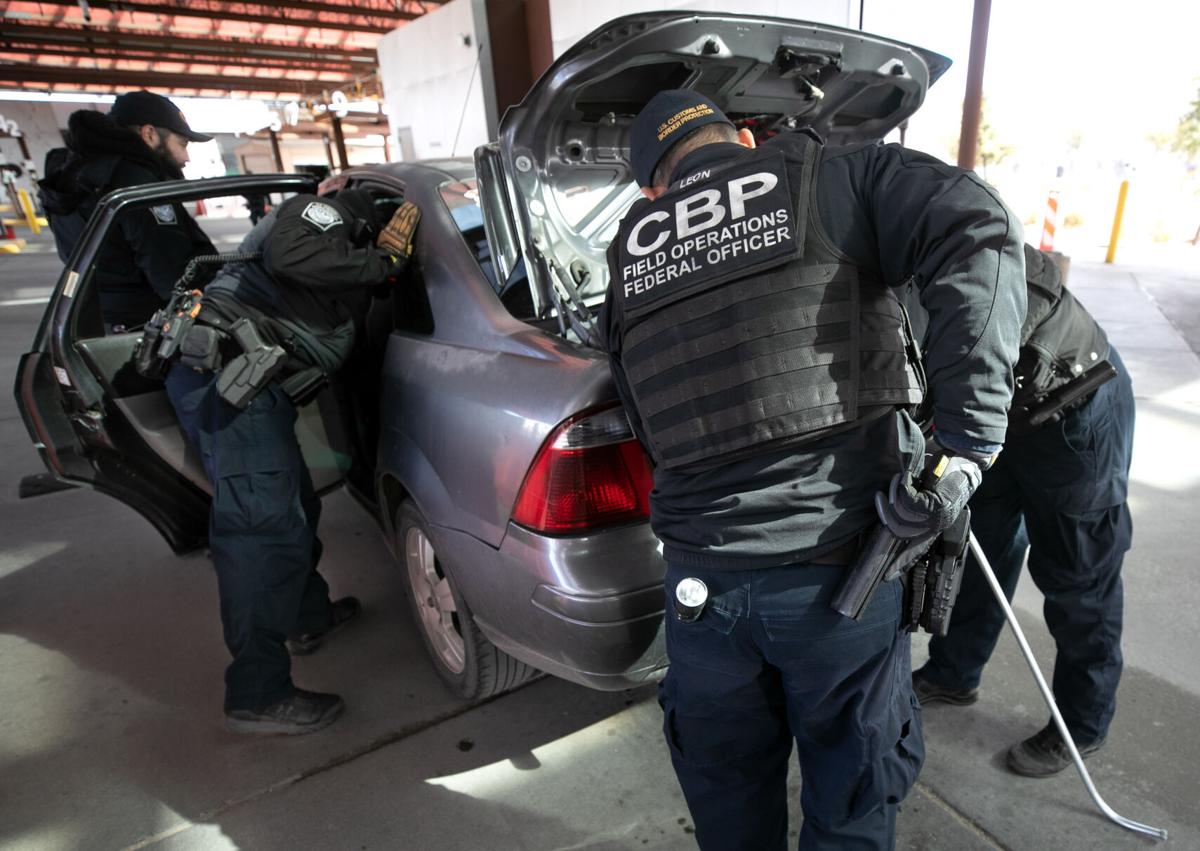The amount of fentanyl seized at the U.S.-Mexico border plummeted in January, in Arizona and nationwide, although Arizona ports of entry continued to have the largest amounts seized in the country.
Nationwide fentanyl seizures fell to about 1,200 pounds in January after record highs the previous two months, according to Customs and Border Protection data released last week. Border officials seized more than 2,900 pounds in November and nearly 6,200 in December, of which almost 99% was seized at a port of entry.
Arizona’s fentanyl seizures fell to 690 pounds seized in January after setting records in November and December when border officials seized about 2,100 and 1,800 respectively — also setting records for the most seized in one month for any Customs and Border Protection entity, nationwide, apart from one huge seizure at a Miami port of entry of 3,772 pounds of fentanyl in December.
Although the numbers dropped in January, fentanyl seizures at Arizona ports are still way higher than in the last three fiscal years, said Nogales Port Director Michael Humphries. November and December had some seizures that were exceptionally large, but they continue at a record pace, he said.
“We've already seized more fentanyl this fiscal year, which began in October, than we did all of last year in its entirety,” he said. “Last year was double what we got the year before. So fentanyl seizures have really gone up. And this month is starting off strong again.”
Fentanyl seizures at Arizona ports of entry totaled 2,300 pounds in fiscal year 2021, 4,600 in fiscal year 2022, and 5,100 from October through January this fiscal year, surpassing San Diego ports, which used to be the hot spot for fentanyl smuggling.

Nogales Port Director Michael Humphries of U.S. Customs and Border Protection at the Mariposa Port of Entry in Nogales, Ariz., Feb. 15, 2023.
While data for February won’t be released until March, the port has found huge fentanyl loads this month, Humphries said, including more than a collective 1.2 million pills and about 4.5 pounds seized over a week, hidden in the rear seat of a vehicle, under tools in a toolbox in the trunk of a car, in a spare tire, in a gas tank, inside a speaker box and strapped to a person’s body.
Similar to the rest of the country, nearly all of the fentanyl seized at Arizona’s U.S.-Mexico border is at ports of entry.
Despite the drastic increase and sudden decline in the weight seized, the number of seizures each month at Arizona ports of entry has remained relatively steady, meaning the size of individual seizures is what’s changing.
The Mariposa port in Nogales is currently installing new technology that will allow it to scan hundreds more trucks a day. Of the two new Multi-Energy Portal systems, for non-intrusive inspection of commercial vehicles, one is up and running in Nogales and the other is being built.
Ultimately, dealing with increasing levels of fentanyl in the U.S. needs to include opioid addiction treatment for Americans, Humphries said. Many of the smugglers are U.S. citizens and addicted to fentanyl themselves. Some of the smugglers caught at the port begin going through withdrawals within a couple hours of being processed, he said.

A K9 and handler from U.S. Customs and Border Protection inspect a commercial truck at the Mariposa Port of Entry in Nogales.
“We've got to do something about the opioid addiction,” he said. “I think it's going to take us(in) law enforcement. It's going to take more availability of counseling, treatment. It's going to take parents and teachers and the medical community. It’s going to take a lot.”
Congressional delegation’s focus
A congressional delegation visited the border in Cochise County on Thursday, saying one of the objectives of the trip was to find a way to better address fentanyl smuggling.
The Republican delegation included Speaker of the House Kevin McCarthy; Rep. Juan Ciscomani, representing a district including a large swath of Tucson and most of Cochise County; Rep. Lori Chavez-DeRemer of Oregon; Rep. Jen Kiggans of Virginia and Rep. Derrick Van Orden of Wisconsin.
Republicans say they are at the border to get ideas on solutions to border issues. But they don’t say what those solutions are.
Although the vast majority of fentanyl is seized at ports of entry, the delegation toured parts of the Border Patrol’s Tucson Sector and met with local city and border officials, but did not visit a port of entry.
“We want to find a result for this issue of the border crisis, specifically around the area of fentanyl,” Ciscomani told reporters invited to a press briefing on John Ladd’s ranch on the U.S.-Mexico border. The Cochise County land owner has been critical of the Biden administration.
When asked by an Arizona Daily Star reporter why they didn’t visit a port of entry on this trip if one of their main objectives was to understand fentanyl smuggling, Ciscomani said officials don’t actually know how much comes through between each port of entry.

A U.S. Customs and Border Protection officer holds an inspection mirror as he watches vehicles inbound from Mexico at the Mariposa Port of Entry in Nogales.
“I can guarantee that a lot of that is coming through the desert as well,” he said. “When you look at the statistics of Border Patrol, saying that they have a 58% success rate of capturing what comes across the border, there's another 42% that we don't know about. So there's a lot more that is coming through both in apprehensions and also in drugs that is not being reported.”
Customs and Border Protection does not publicly speculate on how much fentanyl makes it through the border, but the Tucson Sector only apprehended 4 pounds of fentanyl in December and January combined, meaning another 4 pounds could have gotten through undetected, according to Ciscomani’s assertion.
In November, sector agents seized 104 pounds of fentanyl; even twice that amount would be a small fraction of the 2,025 pounds seized at Arizona ports that month.
Ciscomani said the congressional delegation heard from a representative of the Tucson Crime Free Coalition, which is "focusing on the fentanyl crisis,” at a roundtable earlier that day.
The coalition is a group of Tucson citizens and business owners whose mission statement says they advocate for “adequate staffing and resources for law enforcement, treatment for those in need, and prosecution for criminals who are unwilling to abide by our laws.”
“He was able to speak on this behalf, and we also had federal agents that talked about this,” Ciscomani said. “We had a briefing in the Tucson Sector that touched on this. I wish we could have stopped at different points here today in Arizona, but time was limited. But we did get a briefing exactly on the issue.”
Photos: Nogales road trip in 1956
Roadtrip to Nogales
Updated
Driving on south on Old Nogales Highway in July, 1956. Don't do this at home. Photo by Preston Yeager / Tucson Citizen
Roadtrip to Nogales
Updated
Highway sign on Old Nogales Highway south of Tucson in July, 1956. Photo by Preston Yeager / Tucson Citizen
Roadtrip to Nogales
Updated
Sign warming of dangers on Old Nogales Highway south of Tucson in July, 1956. Photo by Preston Yeager / Tucson Citizen
Roadtrip to Nogales
Updated
Old Nogales Highway at night, approaching Sahuarita in July, 1956. Don't blink. Photo by Preston Yeager / Tucson Citizen
Roadtrip to Nogales
Updated
Nogales, Sonora, bars in July, 1956. Photo by Preston Yeager / Tucson Citizen
Roadtrip to Nogales
Updated
Nogales, Sonora, bars in July, 1956. Photo by Preston Yeager / Tucson Citizen
Roadtrip to Nogales
Updated
Moody beer bottles and glasses in a Nogales, Sonora, bar in July, 1956. Photo by Preston Yeager / Tucson Citizen
Roadtrip to Nogales
Updated
Dancing at a bar in Nogales, Sonora, in July, 1956. Photo by Preston Yeager / Tucson Citizen
Roadtrip to Nogales
Updated
A bartender in Nogales, Sonora, pours salt on his hand prior to a shot of tequila in July, 1956. Photo by Preston Yeager / Tucson Citizen
Roadtrip to Nogales
Updated
Old Nogales Highway in July, 1956. Martha, are we near Mexico? Photo by Preston Yeager / Tucson Citizen
Roadtrip to Nogales
Updated
Old Nogales Highway near Ruby Road in July, 1956. Photo by Preston Yeager / Tucson Citizen
Roadtrip to Nogales
Updated
Old Nogales Highway in July, 1956. Watch out for the highway patrol. Photo by Preston Yeager / Tucson Citizen








